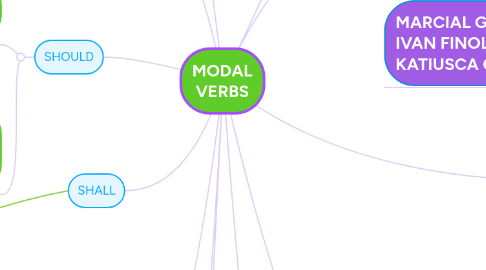
1. MAY
1.1. Used to ask for formal permission
1.1.1. May I come in?
1.1.2. May I say something now?
1.1.3. May I ask one question?
1.2. Used to suggest something that is possible
1.2.1. She may agree with this plan.
1.2.2. They may not be happy about what happened.
1.2.3. It may shower tonight.
2. SHOULD
2.1. "Would" is used to declare a preference and to ask for something politely.
2.1.1. Examples:
2.1.1.1. She (would like) to go to New York someday.
2.1.1.2. I (would like) a beer and my wife (would like) a glass of wine please.
2.1.1.3. (Would) you (like) some coffee?
2.1.1.4. (Would) you (help) me please?
2.1.1.5. When (would) you (like) to go to the movies?
2.2. Note : "would" Used in conditional sentences . See the lesson on conditional sentences for more information on the use of "would"
3. SHALL
4. OUGTH TO
4.1. is used to advise or make recommendations. "Ought to" also expresses assumption or expectation as well as strong probability,
4.1.1. You ought to stop smoking.
4.1.2. Jim ought to get the promotion
4.1.3. This stock ought to increase in value
5. COULD
5.1. Describes an ability that someone had in the past
5.1.1. I could swim when I was young.
5.1.2. You could see the boat sinking.
5.1.3. They could tell he was nervous.
5.2. Often used in auxiliary functions to express permission politely
5.2.1. Could I take this jacket with me?
5.2.2. You could borrow my umbrella.
5.2.3. Could I get you more water?
5.3. Used to express possibility
5.3.1. All of them could ride in the van.
5.3.2. You could always stay at our house.
5.3.3. Could it be true?
6. MIGHT
6.1. " Might" is used to indicate possibilities in the present or the future. In these cases, it is synonymous with "may" .
6.1.1. Examples:
6.1.1.1. I would bring an umbrella, it (might rain) later.
6.1.1.2. It (might be) better to finish this now, rather than wait until tomorrow.
6.2. It can also be used as "may" , to ask permission or make polite requests , although this use is much more common in the UK than in the United States.
7. WOULD
7.1. Is most commonly used to create conditional verb forms. It also serves as the past form of the modal verb "will." Additionally, "would" can indicate repetition in the past.
7.1.1. If he were an actor, he would be in adventure movies.
7.1.2. I knew that she would be very successful in her career.
7.1.3. When they first met, they would always have picnics on the beach
8. DEFINITION AND USES
9. A modal is a type of auxiliary (helping) verb that is used to express: ability, possibility, permission or obligation.
10. Is often used in formal situations (legal or legalistic documents, minutes to meetings, etc.) to express obligation, even with third-person and second-person constructions
10.1. I Shall never forget where I came from
10.2. He Shall become our next king
10.3. I'm afraid Mr. Smith shall become our new director
11. WILL
11.1. used for talking about or predicting the future
11.1.1. You'll be in time if you hurry.
11.1.2. Fred said he'd be leaving soon.
11.2. used for showing that somebody is willing to do something
11.2.1. I'll check this letter for you, if you want.
11.2.2. They won't lend us any more money.
11.3. used for stating what you think is probably true
11.3.1. That'll be the doctor now.
11.3.2. You'll have had dinner already, I suppose.
12. CAN
12.1. Used to express ability (to be able to do something)
12.1.1. I can make jewelry.
12.1.2. He can’t speak French
12.1.3. Can you open this jar?
12.2. Used to ask for permission
12.2.1. Can I use your bathroom?
12.2.2. Can I leave now?
12.2.3. Can I raise the volume?
12.3. Used to make requests or suggestions:
12.3.1. Can I have more napkins?
12.3.2. Can I have the bill?
12.3.3. You can take this spot if you like.
13. MUST
13.1. It indicates an obligation, prohibition or need. You can also use "have to" (have to) .
13.1.1. Examples:
13.1.1.1. You (must [have to] read) this book, it’s fantastic.
13.1.1.2. You (must [have to] brush) your teeth two times a day.
13.1.1.3. We (must [have to] leave) now or we will be late.
13.1.1.4. You (must not drink) and drive.
13.1.1.5. When (must) we (meet) you?
13.2. You can also use "must" to indicate probability or take something.
13.2.1. Examples:
13.2.1.1. John’s not here. He (must be) sick because he never misses class.
13.2.1.2. It (must) be difficult to learn a new language as an adult.
13.3. You may also use "must" for rhetorical questions.
13.3.1. Examples:
13.3.1.1. (Must) you always (be) late?
13.3.1.2. (Must) she (talk) so much?
